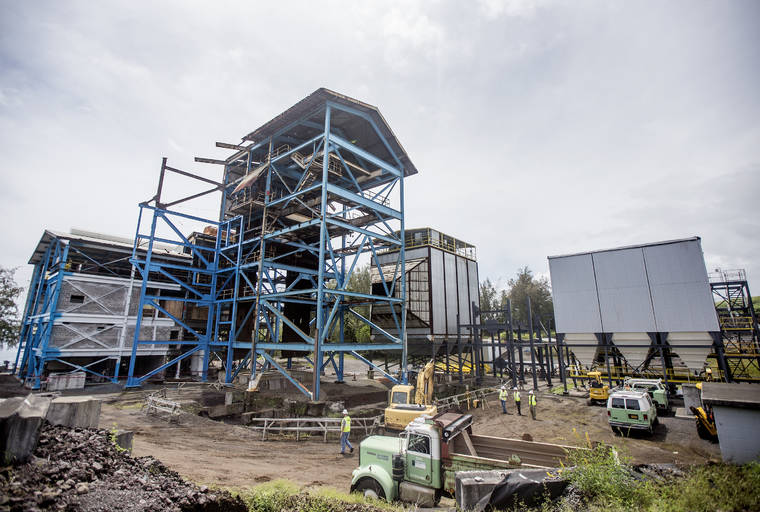The state Supreme Court on Friday overturned the Public Utilities Commission’s 2017 decision and order approving the amended power purchase agreement between Hawaii Electric Light Co. and Hu Honua Bioenergy LLC.
Under that agreement, HELCO would purchase energy from the 21.5-megawatt biomass-fueled powerplant under construction at the former Hilo Coast Processing Co. sugar mill site in Pepeekeo.
The “all-in cost,” which includes fixed and variable payments, is 22.1 cents per kilowatt-hour, according to Hu Honua.
The PUC approved the agreement without holding a hearing.
The court’s 5-0 decision sends the matter back to the PUC for further proceedings.
According to the 66-page opinion written by Chief Justice Mark Recktenwald, the court ruled “the PUC erred by failing to explicitly consider the reduction of (greenhouse gas emissions) in approving the amended power purchase agreement, as required by statute … .”
The high court also ruled the PUC denied due process to Life of the Land, a nonprofit environmental group which sought party status to address the environmental impacts of the wood-burning powerplant, “to protect its interest in a clean and healthful environment by restricting its participation in the proceeding.”
“We are very happy with the Hawaii Supreme Court decision, and we look forward to a full discussion of greenhouse gas emissions at the Public Utilities Commission,” Henry Curtis, Life of the Land’s vice president and executive director, said. “I think the Supreme Court has given sufficient marching orders to the Public Utilities Commission that we will be able to present our case there.”
Curtis pointed out that greenhouse gas regulation by the Department of Health and the PUC fall under different statutes.
“They both were given separate and distinct authority to regulate greenhouse gasses, and neither statute referenced the other one,” he said. “So they each have their own standard to meet greenhouse gas emission analysis. And so, it will be very important for the PUC to establish what methodology it wishes to use.”
Life of the Land also had argued Hu Honua’s price wasn’t in the public interest when compared to cheaper solar electricity proposals previously approved by the PUC.
Marco Mangelsdorf, owner of ProVision Solar and spokesman for Hawaii Island Energy Cooperative, called the ruling “a very, very big deal — and not just because I support it” — and “great news on multiple fronts.”
“First, it’s a clear recognition that there’s a big difference between a renewable energy source that puts greenhouse gasses into the atmosphere and those which don’t,” Mangelsdorf said. “Second, the contract terms were atrocious for Big Island ratepayers, locking in the utility company for 30 years at an outrageously high power price. Finally, we can and must do better than burning stuff when it comes to new power generation. I have every hope that our currently constituted commission will put an end to this boondoggle of a power plant once and for all.
“This is the first time that I’ve been aware of that the Hawaii court is officially, for all intents and purposes, overturning a regulatory decision from our Public Utilities Commission, which is, generally speaking, given wide latitude and discretion to make decisions” he added. “I cannot think of a precedent in the past decades similar to this where a Hawaii court has overturned a PUC decision.”
Curtis said he and Life of the Land are looking forward to “a very interesting proceeding.”
“The current chair of the Public Utilities Commission, Jay Griffin, in his 2008 doctoral thesis, discussed the fact that not all renewables are equal, that they have different impacts. And he specifically mentioned biofuels.”
In a statement, Hu Honua President Warren Lee said he is disappointed by the ruling, which it said would delay bringing more renewable energy to the island.
“Hu Honua has already expended approximately $200 million, and construction on the plant is nearly complete,” he said. “We will work with the Public Utilities Commission and Hawaiian Electric Company to fully address the issues identified by the Court on remand so that the Hu Honua project can provide clean, renewable energy as soon as possible.”
HELCO representatives couldn’t be reached for comment.
Reporter Tom Callis contributed to this report.
Email John Burnett at jburnett@hawaiitribune-herald.com.



